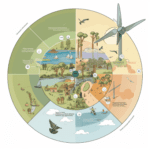
Fede: Welcome back to another episode of “Data Politics at datatunnel”. I’m your host, Fede, joined by our insightful co-hosts, Val and Nick. Today, we’re diving into the role of data in environmental policy and sustainability. As climate change and environmental degradation continue to pose significant challenges, data-driven approaches are becoming increasingly important in crafting effective policies. Let’s get started.

How Data is Transforming Environmental Policy
Val: That’s right, Fede. Data plays a crucial role in understanding the complexities of environmental issues and identifying effective solutions. By collecting and analyzing various types of data, policymakers can better understand trends, measure the impact of policies, and make more informed decisions.
Nick: One example of this is the use of remote sensing data from satellites to monitor deforestation, land use changes, and greenhouse gas emissions. This kind of data can help policymakers track progress towards climate goals and identify areas that require additional efforts.
Val: Another example is the use of data to inform policies on renewable energy. By analyzing data on energy consumption, weather patterns, and infrastructure, policymakers can identify the most suitable locations for wind farms, solar panels, and other renewable energy projects.
Success Stories in Data-Driven Environmental Policy
Fede: Those are some great examples of how data can inform environmental policy. Can you share some specific success stories where data-driven approaches have led to positive outcomes?
Val: Sure, Fede. One success story is the European Union’s Emissions Trading System (ETS). This cap-and-trade system relies on data to monitor and regulate greenhouse gas emissions from industrial sectors. By setting a cap on emissions and allowing companies to trade emission allowances, the ETS has successfully reduced emissions across the EU.
Nick: Another example is the use of data in water management. In California, for instance, data from remote sensing, groundwater monitoring, and weather forecasting has been used to optimize water allocation during periods of drought. This data-driven approach has helped to reduce water waste and promote more sustainable water use practices.
Challenges and Limitations of Data-Driven Environmental Policy
Fede: Those are some impressive success stories. However, we know that there must be challenges and limitations associated with using data in environmental policy. Can you elaborate on some of these?
Val: One major challenge is ensuring data quality and accuracy. Environmental data can be subject to various sources of error, and if not properly validated, it could lead to poor policy decisions. Investing in robust data collection and validation processes is critical to overcome this challenge.
Nick: Data privacy and security concerns are also important considerations. As more and more data is collected on individuals and their behaviors, it’s crucial to ensure that this information is used ethically and securely.
Val: Additionally, there’s the issue of data literacy among policymakers and stakeholders. For data-driven environmental policies to be truly effective, decision-makers need to have the skills and knowledge to understand and interpret complex data insights.
The Future of Data in Environmental Policy and Sustainability
Fede: Given these challenges and limitations, what can we expect for the future of data-driven environmental policy and sustainability?
Nick: As technology continues to advance, we can expect an increase in the availability and granularity of environmental data. This will likely lead to even more innovative policy solutions and better-informed decision-making.
Val: We also anticipate increased collaboration between governments, researchers, and private sector organizations. Sharing data and best practices can help drive global progress towards more sustainable and environmentally friendly policies.
Fede: Thank you, Val and Nick, for sharing your insights on the role of data in environmental policy and sustainability. As always, it’s been a pleasure discussing this important topic with you both.
To our listeners, we hope you’ve enjoyed this episode of “Data Politics at Datatunnel.” We’ve explored the many ways in which data is transforming environmental policy and sustainability, as well as some of the challenges and future prospects in this field.
As we continue to face pressing environmental issues, the role of data in informing and shaping effective policy solutions will only grow in importance. We encourage you all to stay informed and engaged in these critical discussions.
Nick: And remember, we’re always looking for new ideas and suggestions for future episodes. So, if you have any thoughts or topics you’d like us to explore, please don’t hesitate to get in touch with us.
Val: You can also connect with us on LinkedIn and Twitter to stay updated on the latest episodes and join the conversation. And as the great mathematician and philosopher Bertrand Russell once said, “The only thing that will redeem mankind is cooperation.” Let’s work together to create a more sustainable future through the power of data and collaboration.
Fede: Thanks for tuning in to this episode of “Data Politics at datatunnel.” We hope you’ve enjoyed our discussion on the role of data in environmental policy and sustainability. Don’t forget to follow us on social media and share your thoughts with us. We’ll see you in the next episode!